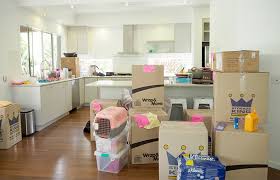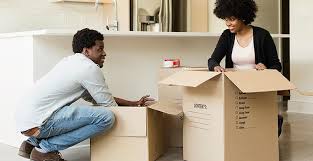Moving Tips for Packing Safely
With the excitement and anticipation of home buying, planning, choosing moving companies and moving itself, it’s easy to forget personal safety. To make sure you and your stuff get to your destination in one piece, remember these a safe packing tips.
REMOVE CLUTTER.
People usually make unsafe decisions when they feel rushed and overwhelmed. A few weeks before you start packing, downsize your stuff and declutter your garage. Not only will you have less to pack, but when you do, you’ll be more organized and have room to move around unencumbered.
- Go through each room of your home and put unneeded items into one of four piles: discard, sell, donate and return
- Discard unneeded papers, old mail and items that are not in good enough shape to sell or donate
- Sell items of value online or in a garage sale
- Return borrowed items before they accidentally get packed up
- Donate gently used goods to local charities, hospices or homeless shelters—call to see which items may be in high demand
- Before you make the trip to the charity drop-off or garage sale, take one more look through the items you’ll be moving. You might decide that some won’t work in your new home or just aren’t worth moving.

Make a plan
This is the most important part of packing—and it’s also where most people go wrong. You know how the saying goes: If you fail to plan, you’re planning to fail.1
Once you know what date your mover is coming, you’ll want to plan your packing days. (If you haven’t hired a mover yet, then now is the time to start shopping around). And don’t expect to pack up your whole three-bedroom house in one day —it always takes longer than you expect.
Block out two or three full days on your calendar. List the rooms you need to pack up and assign a few of them to each day.
Pro tip
Pack up a big central room first so you can use it as a “packing room” where you keep all of your supplies and finished boxes.

Gather enough supplies
You won’t have time for multiple trips back and forth to the store to pick up boxes and other packing materials, so it’s important you get what you need on the first go. Start with our packing calculator, which will give you a good estimate of how many boxes you’ll need after you plug in a few key details. Figure that you’ll need about ten to twenty boxes of various sizes for a studio, twenty to forty boxes of various sizes for a one-bedroom home, and so on. Make sure to pick up a couple wardrobe boxes too so that you can pack your clothes without having to pull them off their hangers and fold them.
In terms of packing supplies, a good rule of thumb is to figure out how much you think you need, and then buy more than that. Don’t forget the essentials, like packing tape, packing paper, and, if you’re going to be moving yourself, furniture protectors.

Ask for help
Moving is a big task, particularly when it has to get done quickly, and it’s totally okay to turn to your friends or family for some helping hands. Having one or more helpers can help you stay on track and prioritize, in addition to assisting you in just getting the job done faster. Truly time consuming tasks like packing up your kitchen cabinets and getting items dropped off for donation become significantly more simple when you’ve got another person (or persons) helping you out. Don’t be afraid to ask for help, but do be sure to show appreciation by ordering in a meal while they’re helping you pack or baking your helpers some cupcakes once
Make an Inventory List for Your Belongings
Before you put anything in a box, make sure you create a detailed inventory list for all your items. It can be color coordinated with tape, numbers, or written labels on boxes, but just make sure you do it. It’s important to know what box holds what items, otherwise when you start to unpack at your new home, you will be frustrated opening each box to see what it contains. Even something simple like “Kitchenware”, “Bedding”, or “Winter Clothes” can be helpful when it comes to getting settled into your new home.